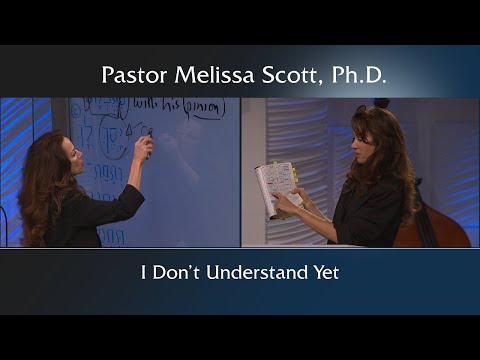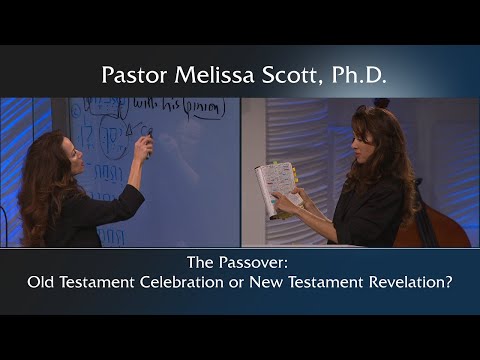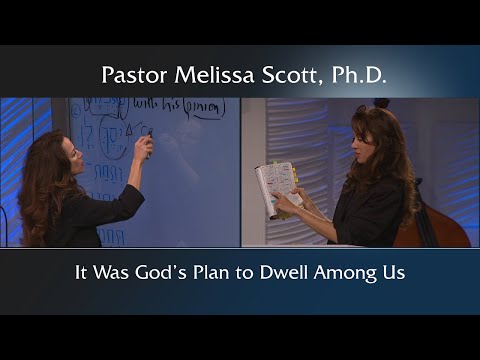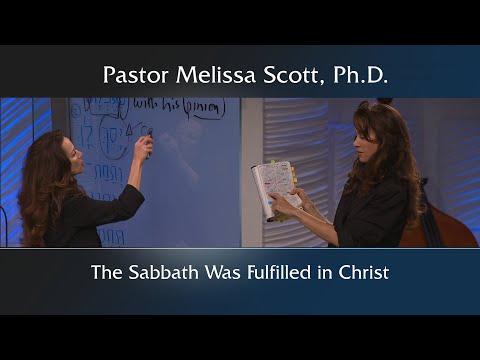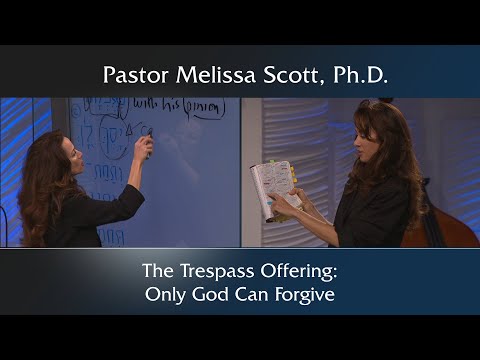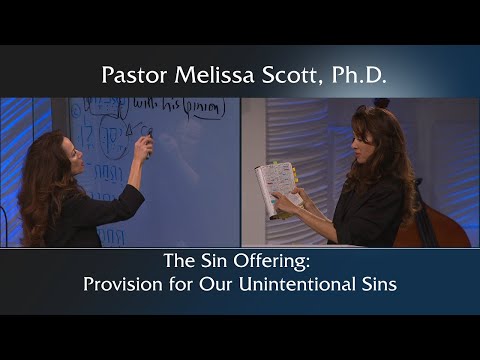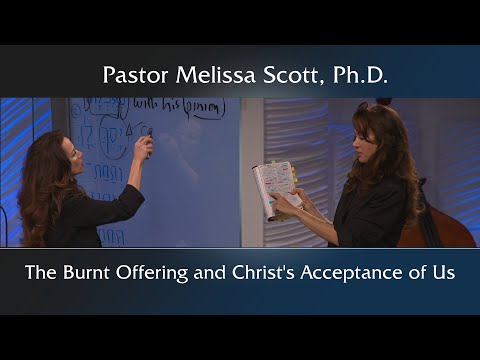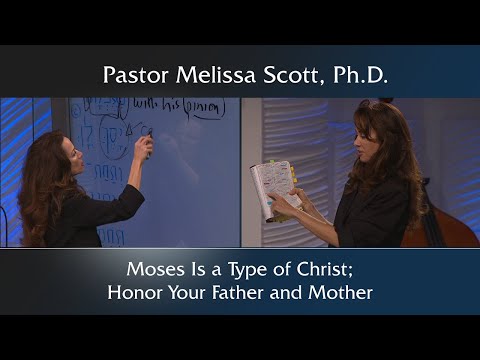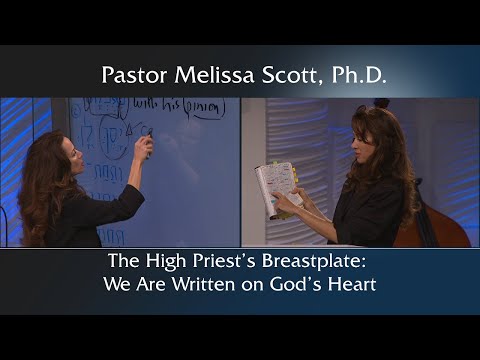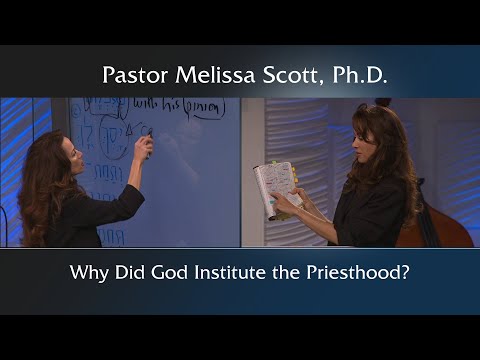There are way too many people in ministry today who are self-appointed. And when I say that, people say, “Well, sure, because you didn't want the position, and you can say that”" No, I can say that because I have seen too many people who want to partake as, we'll call it the lead figure in a ministry, but they're not willing to take everything that comes with it, and it's self-appointed, “I should be,” “I am,” versus, you know, at some point, it's kind of like Jonah. It's, it is the Jonah syndrome, okay? If God wants you to go somewhere, eventually you're going to end up going, and that includes every direction of your life.
So I think, you know, I could have said, applied to me, I could have said, “Well, I,” and I did say that, “Who am I? I'm not qualified.” I can━you fill in the blanks of all the things I said over the years. But if God has called you that's going to be something, we'll call it rather inescapable. You may actually close the door and you may think, “Well, God will leave me alone.” Then, no, God will keep nudging you for a while until it becomes a torment. And then you'll either really pass over the precipice of, “I want nothing to do with God,” or you'll give way and you'll submit.
♪ ♪ Our focus has been the instructions to build the tabernacle, to build the furnishing. But I want you to think about something, the tabernacle would not have made too much sense if God didn't plan to have some attendants, attending, performing, carrying out the work that was designed for this particular tabernacle. Now there's always this big question, why did God institute the priesthood? And there's actually several reasons, not just one singular one, the quick and easy one is, well, these would be educated or they would be schooled in God's ways and they would teach the people. That's the easy one, but there's, there are more, we'll call it subcategories in that “why,” why did God bring on the priesthood, which again typifies something pointing to something else.
The qualifications for the priesthood are listed in Leviticus 21, don't turn there, Aaron and his descendants had to be free from bodily defects. So someone who had some type of deformity, something crippled would be disqualified. And by the way, this same approach would be taken if you look at the offerings and the offerings had to be without blemish. Why? Because they pointed to something else; they pointed to Christ. You know, if you're only, I said if you only are reading the Old Testament, none of this makes any sense.
But when you know the bigger picture, you're like, that would make sense. Christ who basically took on the sins of the world, but knew no sin is in fact, fits that type of “without blemish,” both for the sacrifice, the, we'll call it the high priest, the actual act of sacrificing, the sacrifice itself. So across the board, all of these things, but I just say to you, Leviticus 21, if you read it carefully, pretty much disqualifies most people. That's a nutshell. Now okay, that's my message, let's go home. But the reason why I point this out and I say, please read this in your own time is because there are such specifics there and they all have, there's, there's a reason for everything and I don't think I could get through all of the reasons, but I think some of them are self-explanatory and a nice slow reading along with your concordance might help because there's some strange words in there you might want to look up; just saying. All right, so the duties, obviously to offer and to present the offerings and sacrifices to God.
Sometimes it was the laying on of hands, other times quite frequently it was the slaughter of the sacrifice, the, the sprinkling of the blood, to deal with the remaining portions of the offerings, the carcasses; lots of instructions in the book of Leviticus on what to do with certain types of offerings, that certain portions were kept back for the priests. Other portions were to be completely consumed, so there are all these instructions to minister and to tend to the altar, to take care of the fire (if you remember the fire, specific fire, perpetual fire), the showbread, the trimming of the wicks, the care of the golden candlestick, the incense, and in general to conduct all the practices and worship ordained by God.
The law was entrusted, and this is a, this is where we kind of begin to bifurcate some stuff, the law was entrusted to both the Aaronic line, that is Aaron and his descendants, who were given the task of basically everything that pertains to the innermost part, the inner court and of course the high priest for the inner sanctum responsibilities, and then the Levites who were given the task of instruction, of instructing the nation on God's ways. And we tend sometimes I think to homogenize this because they all had specific functions. And we find that out by something that God instructs. If you read very carefully, for example, Exodus 28.
This is about the, the clothing, but, “And take thou unto thee Aaron thy brother, and his sons with him”" that there's always this reference to Aaron and his sons. So that whole line, which I will be referring to as the “Aaronic priesthood,” and then the, there is the “Levitical priesthood” or the Levites, and then there'll be a subcategory of other folks who would be entrusted to do other, other jobs required. So we'll get to that in a minute. But for most of these people, they were completely devoted to the religious purposes of God. And this is important. Definitions will become important because a lot of times we read about; and people misconstrue this all the time. There are references to the priest being “holy unto the Lord,” and I will talk about this in a few minutes.
That is not the caricature that our modern minds make it. So if you been here any amount of time, think “set apart for God's exclusive use,” holy that way, not holy as in, “I've bleached and bathed and scrubbed and I'm pure and I don't sin,” because whoever says that like somebody actually posted something on my social media feed that said, “We, we're not sinners.” Okay, come back and talk to me when you figured out that, yeah, okay, you're━you knock yourself out there. Anyway, there's also what needs to be talked about these priests, how they were renumerated. And again, this is very important because in our modern understanding, now we're, we do not live in a barter society, not yet; that may be coming, but we don't live in the same concepts of how people operated.
So it's important to understand when God said that these would be renumerated through the firstfruits, the tithe of all the produce of the land, the firstborn of cattle, to be responsible in receiving the presentation of the firstborn males. So, firstfruits and the firstborn were directly presented to the priests, but not the Levites. This is where it gets a little muddy, and people tend to muddy this up a lot. All the tithes that would fall to the Levites, there would be a tithe out of that tithe that would go to the other priests. So it's very, very clear, but again, you've got to read it and separate because we tend to homogenize and put all the priesthood together, and they all had different responsibilities.
When it came time to move the tabernacle; I spent all this time telling you about sockets and boards and things being set up. When it came time to move or to march, guess what? The whole entire camp would have to be taken apart and properly wrapped. God had provisions for everything, coverings, and how to protect and how to carry and how many people would carry, very, very particular. So this increased the number of participants that would be included in the priesthood. We'd get, we'll get to know some of these other names, the Kohathites, the Gershonites, the Merarites, who would have their part in mostly a lot of it being transportation type related service, but they would also have other jobs to do. Of course, as I said, there was a very specific method to moving stuff, but when they arrived at their destination, guess what? They set it all up all over again. How fun, right? Imagine if you're the guy who's got the job of setting the sockets down on the ground.
Never mind. He'd be like, “Wow, again? Can God figure out when we can stop moving?” But every time they arrived at a new destination, the tabernacle, all of its furnishings would get set up again. So for this task now, we have, as I mentioned, the other members of Aaron's family who would be basically drafted into these different positions. The Levites worked more like attendants. So the Aaronites were the priests, of course Aaron being the high priest himself and his sons, and you'll always read, it's very specific, even the header in chapter 29 of Exodus says, “Dedication of Aaron and His Sons.” And I have you notice something very important. Moses is never mixed in with those instructions. He may be given the instructions to, as the mediator, to convey. And remember, this is Moses' family, but Moses is never invoked in any of these instructions, and that's very important. Moses stands apart. Now there is something that happened. There's a passage you've heard me refer to many times over about Korah's rebellion. In fact, I think I mentioned it last week or so, speaking of would God open up the earth and swallow up a couple of━would You be merciful enough to swallow up a couple of people here and there? But that incident, very interesting, because Moses says something when kind of we'll say the battle is on, so to speak, the challenge is on.
And Moses says something very remarkable, which we can glean a lot from, in terms of understanding. Remember, Korah is part of the, the Kohathites, that band from that line. And in the standoff, if you want to call it that, Moses says, “Tomorrow Jehovah will show who is His, who is holy, and will cause him to come near unto Him: and whom He will choose, He will suffer him to come near unto Him.” And that was basically a response or rebuttal to Korah basically saying, “Well, you know, we're just as capable,” a little bit like a Miriam syndrome, “We're just as capable as whoever else is doing this, so why not us?” So very interesting, because in those instructions, in that declaration, if you will, there are a lot of things we can glean about the order of things.
When Moses says, “Tomorrow Jehovah will show who is, who is His,” just put a, put a point right there, number one, “who are His by election” in this case; not self-appointment. And again, I'm, I'm going to go back and forth a lot. This may sound a little choppy, but if you follow the flow, it'll all make sense. There are way too many people in ministry today who are self-appointed. And when I say that, people say, “Well, sure, because you didn't want the position, and you can say that”" No, I can say that because I have seen too many people who want to partake as, we'll call it the lead figure in a ministry, but they're not willing to take everything that comes with it, and it's self-appointed, “I should be,” “I am,” versus, you know, at some point, it's kind of like Jonah. It's, it is the Jonah syndrome, okay? If God wants you to go somewhere, eventually you're going to end up going, and that includes every direction of your life.
So I think, you know, I could have said, applied to me, I could have said, “Well, I,” and I did say that, “Who am I? I'm not qualified.” I can━you fill in the blanks of all the things I said over the years. But if God has called you that's going to be something, we'll call it rather inescapable. You may actually close the door and you may think, “Well, God will leave me alone.” Then, no, God will keep nudging you for a while until it becomes a torment. And then you'll either really pass over the precipice of, “I want nothing to do with God,” or you'll give way and you'll submit. Boy, I'm using a lot of words that people will just go, “Oh, I can't━did you just say that?” Yeah, I just did, because that's the way it works. So the━God will show who, who belongs to Him as opposed to the self-appointed. So that's one.
The next thing He says is, “Who is holy?” Remember, who is set apart, not who is clean, who is set apart for God's exclusive use? And God has a way of sorting that out too, by the way. There's a lot of people that come and they want to be ministers and they're not willing to be exclusively; again, I'm going to get flack for this, they're not willing to be God's tool. They want to be kind of a little bit of everything. So this is very informative for anybody who says, “Well, how does this work?” I'm just telling you, God has not changed, “Who He will cause to come near unto Him,” in this case now we are a complete and royal priesthood, but back then God had said, “Only the ones that I choose to do these certain tasks.” And then we'll call it, because I've gone down the points here, the last two are related to each other in that drawing near to God in any type of service in the Old Testament, the approach to God, the act of bringing an offering or offering before the Lord at different times.
And that would also include bringing back to the people at times, the remnant that would go back to the people or something, a benediction or blessing that would come from God back to the people. So if you think about it, in these words that Moses used which I believe are in Numbers, you really get a good understanding of why God opened up the earth and swallowed up that band of people. And it's very, very clear. You know, sometimes you can read something, you pass it by, but this one makes it abundantly clear. So the offerings, also God didn't want somebody self-appointed to help themselves. And there are folks chronicled both in this book and in real life who have done just that. So now back to the reason why God put all this together. Yes, there was the necessary need to educate the people and explain to the people, but I'd like to point something out which shows you another, I'm going to debunk another one of these modern stupidities that's always put on me or I hear it and it makes me cringe.
Back in Exodus 20, we have something that makes it abundantly clear of why God implemented something. In Exodus 20, you've got the giving of the Ten Commandments and then after all that happens, in verse 18, “And all the people saw the thunderings, and the lightnings, and the noise of the trumpet,” I know you're saying, “Where'd they get the trumpet?” I know, “and the mountain smoking: and when the people saw it, they removed, and stood afar off. And they said unto Moses, Speak thou with us, and we will hear: but let not God speak with us, lest we die. Moses said unto the people, Fear not: for God has come to prove you, and that his fear may be before your faces, that ye sin not.
And the people stood afar off, Moses drew near unto the thick darkness where God was.” Now I want you to think about something, and please put this in perspective. This goes back to God's sovereignty and God's prerogative. Why were the people afraid? Well, we know what was said in times of old: if you saw God, you would die. But what separated Moses from the rest of these people? I want you to really think about this. Moses was a murderer. Moses murdered a man in Egypt, and this is the one that; no, let me add to that. He murders a man in Egypt. He spends the first forty years of his life basically living in the pleasures of Egypt. The next forty years of his life on the backside of the desert looking at donkey butts probably, okay? And the last chapter of his life he's now going to be this obedient servant to God, somewhat; we'll say 99 percent.
But I'm asking you to think about something. This is the one that God chose to be the mouthpiece. Was Moses perfect? No. More importantly, I don't read, and I can't tell you because it's not chronicled for me, but I don't read of any of these people standing at the bottom of the mount having killed a man. And yet they were afraid of God and Moses presented himself. And there's a lot right there that I said to consider. But if you want to put it in ways to focus, very clearly, God knew everything about Moses, and yet still chose Moses. This is why I won't tolerate people saying, “Well, a person in the ministry has to be,” and they fill in what they think the person needs to be.
It doesn't work like that with God. This tells you right here, take a good look at how God does things. He never chooses the popular person, because Moses had become hated. If you think about it, when he slew in Egypt, when he killed a man, the people turned on him, even though he thought he was doing a good thing. So don't get all this idea, it's all this modern crap that people want to put on a minister or a ministry and it just doesn't work like that. If you're reading this book, it's very clear and I could catalog all the people who are the least desirable, most unsuspecting, and yet Moses is the one who God speaks to at the burning bush.
Moses is the one that God chooses, and yet I don't read Moses was fearful or Moses said, “I fear God.” I mean, there was a point at first, but then of course he is talking with God, receiving the message, receiving the instructions, yet these people at the bottom of the mount, they see all this and they're fearful and they draw back. And Moses says something very interesting, “Fear not, for God has come to prove you,” and we've gone over that word before, “to prove you,” “that his fear may be before your faces, that ye sin not.” So just, I'd ask anybody in the sound of my voice to really pay attention to this.
Ministry, which is what I do, any type of arm of the ministry and the people who sit in, involved in the ministry, hearers, listeners, participants, again, Romans 3:23, “All have sinned,” here's a perfect example for you. But it's all in the way, if you think about it, Moses at the first said, “Who am I? I can't speak. I don't know what to say,” and then begins to have a relationship with God, much different than the people who, by the way, never cultivated; they saw everything that God did, but they never came to know who God was.
And that's another important piece of information here. So, I would just say this is kind of one of those catch-all things when people say, “Well, a minister of God,” just take a good look at the people that God chose and used who stand out as the prominent figures, and Moses, by the way, being both a prominent figure in Christianity and Judaism, yet, I seldom, if ever; and I've heard a lot of different rabbis and commentators, I seldom, if ever hear people speak on the very human Moses, the very sinning Moses who could get mad, get, get mad at the people's grumbling; actually got a little bit miffed at God, because we tend to morph these into special people, but they were just like us. And that's the other thing I want you to put note to self. So, if anybody says, “Well, I don't belong,” because somebody posted something somewhere and said they didn't feel welcomed being a part of the social universe that basically tunes in━you don't have to feel welcomed by other people.
Haven't you learned this? Other people, if we were living back in Moses' day, they'd be stoning you. Instead, now they just play cowardice, and they call you a name and they run away and hide behind a little fake handle, right? You don't have to feel welcome. You feel welcome in the Lord. The Lord makes you feel at home. That's how that works; so don't confuse the things. Okay, so the Levites and the priests had a very unique situation, back to that now, as they did not receive territory as all the other people were prescribed land that once they entered into the Promised Land, this territory would belong to this tribe and this territory to this tribe, but 48 cities were assigned to them as dwelling places, distributed among the tribes that they might teach the children of Israel all the statutes which the Lord had spoken unto them by the hand of Moses.
Thirteen of those 48 cities were designated cities of the priests. You can read about those in Numbers 35, Joshua 21, and 1 Chronicles 6. Six of those, of the 48 cities, were cities of refuge and that's another very interesting sub-subject to read about. But that could be for another day. Right now I'm trying to focus on everything that's related to the priests, the priesthood, the Levites and anything that goes along with this work. The consecration of the priests, as I think I just pointed out, you'll find it in Exodus, but the act of consecrating was not carried out until everything about the tabernacle was complete, so we're reading things that are not quite in order. So when God said, “Build Me a place to live; build the ark first, and then all the components,” basically God started from the innermost part and worked His way out. But He still had to make plain the concepts of sacrifice and offering and the function, the work of the ministers.
So these would only be consecrated when everything else was finished. So you probably, you'd be safe to say that the consecration of the priests occurred somewhere very late in the book of Exodus, if we were trying to be chronological about this, or possibly even as early, some part, I will say definitely before the book of Leviticus was written because that is the laws of the offering. By then we would have had dedicated priests, so just a note to self. The consecration had two parts to it, each having three distinct actions. So the first was the washing, clothing, and anointing of the chosen priests or recipients. The second was the need to offer a sin offering, a burnt offering, and a peace offering. And what's kind of interesting is there's a whole procedure for this. Let's see if I think I stuck this on the margins of my Bible in Exodus 29, at about the fourth verse it says, “And Aaron and his sons shalt bring unto the door of the tabernacle of the congregation, and shalt wash them with water.” So you've got them first being washed with water.
In the fifth verse it is their clothing, “Thou shalt take the garments, put them upon Aaron the coat, the robe of the ephod, the ephod, the breastplate, and gird him with the curious girdle of the ephod,” think of that as more like a belt because it's strange to refer to it as a girdle in our modern verbiage, “thou shalt put the mitre upon his head, and put the holy crown upon the mitre.” And then the last but not least in verse 7 is the oil; so you've got water, clothing, and oil as the distinct parts, and then finally we would move on to read about how they would take the blood of an animal that would be slayed, specifically designed. The blood would be applied to the altar. And then of course the blood would be applied to the right ear, the right thumb, and the right big toe of the priest. And I've covered this before, symbolically you kind of get the idea that the blood on the ear, on the right ear; the right is always considered the side of power.
So the right for listening and obedience, the hand to work, and the foot as the walk, we would say our walk of faith. So you've got that as well as part of the ceremony. As I said, the clothes, the anointing oil, and then the anointing oil, there's a whole detailed recipe for that which would be myrrh, cinnamon, calamus, cassia, along with olive oil, and that would be poured on Aaron's head. Now let me stop right here because I've said to you through all of these teachings, everything points to Christ in some way, shape, or form.
And of course Christ, we know if you go right━read the book of Hebrews in the New Testament, the reference is unmistakable even if we didn't have the book of Hebrews to see that Christ is our high priest, functioning for us just like the high priest did except we don't need these repeated exercises or ceremonies. He did it once and for all. But functioning as our high priest, and then you've got the anointing part to the priest pouring the oil upon his head, which interestingly enough there is not a clear mention of the sons, but specifically to Aaron. So think about that. The high priest is anointed and that oil will take the place of the Holy Spirit which is obviously not poured out at this time, so we'll call it the unction of the Spirit, the ability to function within that realm. And here's another interesting one of these things that I'm going to tell you. See, if you're not reading this and understanding there may be a breakup in events, they're not laid out chronologically.
Remember I've said to you in the book of Exodus you've got events of coming out of Egypt and then you see Moses receiving the tables of stone, and right in the middle of the book of Exodus we have the golden calf event that happened, right? So you've got to put all this in perspective that this would have been kind of behind in Aaron's past as well, him participating in succumbing to the pressure of the people to have something to worship while Moses was up on the mount, so think about that as well when we talk about imperfect servants. Moses was not that and if you look at Aaron's behavior he was not that. A real man of God or a person of God, a servant of God would have said to the people, you know, “We need something to worship.” “Hell no! Just shut that down. It's not happening. We're going to wait for Moses.” But I just want you to think this happened before the dedication and consecration.
So this is in Aaron's past and not a very good look, if you will, if we were looking to, ah, we're going to look at the résumé of the incoming priest: “Oh, I see, he had a golden calf event here.” So, all right, what we have though, the priestly functions that were consecrated, if you will, the introduction; it's Moses. But Moses is not part of that. So I always want you to remember something. Moses stands separate, Aaron and his sons are separate, and then the Levites are separate. And this is important because a lot of times we tend to just kind of blend everything together, but they all had specific tasks and functions. The description of the priest's clothing begins in Exodus 28 beginning at verse 2, “Thou shalt make holy garments for Aaron thy brother, for the glory, for glory and for beauty.
Thou shalt speak unto all them that are wise hearted, whom I have filled with the spirit of wisdom, that they may make Aaron's garments to consecrate him, that he may minister unto me in the priest's office. And these are the garments which they shall make: a breastplate, an ephod, and a robe, and a broidered coat, mitre, a girdle: and they shall make holy garments for Aaron thy brother, his sons, that they may minister unto me in the priest's office. They shall take gold, blue, purple, scarlet,” or red, “and fine linen. They shall make the ephod of gold, of blue, of purple, of scarlet, fine twined linen, with cunning work.” So here begins the description of all the clothing.
And of course I described these two shoulder pieces joined at two edges thereof, the curious girdle; think of that more as a belt, which is upon the ephod, if you will, to kind of keep everything together, and then there again, gold, blue, purple, scarlet, fine, twined linen. “Thou shalt take two onyx stones, and grave upon them the names of the children of Israel: six of their names on one, and six on the other that rest on the other stone, according to their birth,” so in, basically in birth order.
“With the work of an engraver in stone, like the engravings of a signet, thou shalt engrave the two stones,” all the names are going to be put upon it. “And thou shalt take the two stones,” put them on the, “upon the shoulders of the ephod for stones of memorial unto the children of Israel: and Aaron shall bear their names before the LORD upon his two shoulders for a memorial.” I want you to stop and think about this for a minute. So these six and six are basically the names of all the tribes of the children of Israel, so twelve in all. And when the priest is going to be wearing this garment and also the breastplate which will have the twelve stones on it, this will be always becoming or being presented before the Lord.
So I want you to think about something, because it seems a little bit like, wow, that must be very blingy. But what it was, if you think about it, carrying the weight of the people on one shoulder and carrying basically the people in your hearts. That's symbolic meaning, and it takes me immediately to our great Shepherd, and the picture of Him going after the one lamb, placing it upon His shoulders.
But it's the same thing, both heart or chest and shoulders. So it seems a little strange because you've got all these strange, we'll call them approach to making garments. For example, he goes on to say, “and thou shalt make ouches of gold”" or settings of gold, “two chains of pure gold at the ends; of wreathen work shall thou make them, fasten the wreathen chains to the ouches,” or to the settings. “Make the breastplate of judgment.” And that's another thing that is seldom, if ever, people talk about the breastplate, but they don't use the full word, “breastplate of judgment with cunning work, after the work of the ephod thou shalt make it gold, blue, purple,” and we go on with, and I've told you all the colors. You can go back into previous messages and refer to what the colors or the materials are for.
“Foursquare it shall be being doubled; shall span the length thereof, shall span the breadth thereof. And thou shalt set in, in its settings of stone, four rows of stone,” and then it goes on to tell “the first row shall be sardius, topaz, carbuncle, first row,” second row, giving all the stones, which we're going to talk about in a minute. Now if you keep going down, verse 21, “The stones shall be with the names of the children of Israel, twelve, according to their names, like the engravings of a signet, every one with his name shall be according to the twelve tribes.” So this is all the instructions of, all the way down to the hem of the bottom of the garment for the high priest.
It's very detailed. There's a lot of information there. Why I think this is very intriguing, everything has meaning here. So as I said, the shoulder stones, if you will, and it's kind of interesting, because these people came and they were prescribed ways before God in the offerings: sin, trespass, given all the different offerings, but it was still the burden of the high priest to bear their names, so basically bearing them and bringing them in to the place they could not go.
Now we don't have that anymore. Each person stands alone and before God. We don't need someone to stand in between. This is why it's very frustrating when I talk to a lot of people who are still in the mindset that you need a, an intermediary person here on earth to go to God and I'm sorry, it's not there. It was there in this Testament, but Christ became the mediator for us, the only mediator you'll ever need.
It doesn't talk about Mary being the mediator. It doesn't talk about anybody else but Jesus who is, if you want to say the go-between, but He's the direct line. There's nothing in between that for the believer. I don't know why that's so hard for people to understand. Okay, the breastplate in the Septuagint is translated logion, which is very interesting because if you look up that word, it says “oracle,” and I'm not sure if they might have been referring to what went additionally into that breastplate. With the 12 stones there were something very peculiar, which I will not get to today, but we'll talk about the Urim and the Thummim, which those, we'll call them apparatus if you will, I guess would give guidance in some ways.
So I think that the Septuagint basically took the logion, “oracle” to attach on, not to the stones, but onto these interesting, whatever you want to call them, but the Urim and the Thummim. So that's one thing. And then of course, what, where were these stones found? All of these stones, but the two peculiar ones, which is another mystery that we'll have to talk about. And then the names, as I said, that would appear on the stones. So for example, and please do not do the traditional thing where people will read the stones and then think, “Oh, and that's this color,” because it's not as easy as that. If you start investigating from the Hebrew and you try and look these things up, you're going to pull your hair out. So for example, carbuncle, which is the first stone I'm going to talk about, which would be related to Zebulun. And what is said about the carbuncle in Hebrew is derived from a root used for “lightning” or “glittering,” and the Hebrew word is bâreqeth, a stone that glittered or was like light.
The late Dr. Driver did not translate the stone as carbuncle, but said it should be referred to as “rock crystal,” because it would flash with a great color spectrum. No one is actually sure, a lot of these stones, no one is actually sure of the correct━and trust me, if you start getting into the linguistics of it, you're just going to be very frustrated. So I'm warning you if you decide to go down that pathway, you could say, “She said so.” The Septuagint and Josephus seem to prefer the rendering of this carbuncle as snaragdos, which is emerald.
Don't ask me. And Pliny spoke of at least 12 different varieties of this stone, so not sure what you do with that, but that's why I said it's not cut and dry. But there's, there's relevance to all this. And let me tell you what the relevance is. So back in Genesis 30, we read about when Zebulun came into the world, and Leah says, “God hath endued me with a good dowry; because I have born him six sons: she called his name Zebulun.” The name, his name, all the names mean something. His name means “dwelling.” If you keep reading, when Jacob is about to die, Jacob/Israel is about to die and blesses his children, he says that Zebulun would “dwell at the haven of the sea; and that he should be a haven for ships; and his border shall be unto Zidon.” If you keep reading, because Moses will do another blessing on the rest of the tribes as well, Moses says, Zebulun, along with Issachar, “Rejoice Zebulun, in thy going out; and, Issachar, in thy tents.
They shall call the people unto the mountain; there they shall offer sacrifices of righteousness: for they shall suck of the abundance of the seas and of the treasures hid in the sand,” Deuteronomy 33. So evidently Zebulun had some attachment to the sea, to the portion of water, maybe a place of safety for ships. And minimally, if you want to take everything that's said between Jacob and Moses, it might be a combination of two things, but they would be seen possibly as people dwelling, almost like lighthouses, if you will, “safe haven of ships,” calling the people, because if you read the rest of what Moses says, calling the people unto the mount, which will be those being called to worship. So very interesting that if you want to kind of put it into a pictorial thing, Zebulun might be seen as a lighthouse or a light bearer.
So I, in where it lists the stones, I kind of put down these little ideas that might help, that give some idea, because when you look at all the stones and, and/or the names and what they represent, there's a picture being painted, and that picture's pretty interesting. The next stone is topaz. A stone, again, don't think traditional, how you under━if you know stones, and you're into any type of precious stones, gemology, whatever; do not think traditional here. This stone is described as yellowish, greenish, brownish, from the Hebrew word. Try that one on. Pitdâh in the Hebrew, meaning “engraved,” this stone bore the name of Issachar upon it, Issachar's name in Hebrew connotes “recompense” or “reward.” And so, again, another interesting thing, when I started looking into this, I noticed something. Do you remember when God is speaking to Abram, and He says, “Fear not, Abram, I am thy shield and thy exceeding great reward,” you'll find a cognate of Issachar's name. Every time you find “reward,” you find his name attached there. It's very interesting.
Or if you go to the Greek interpretation of this stone, it is “to seek.” So you could, maybe if you wanted to combine the two meanings, I'm not sure that that's doable: a reward for seeking diligently. But nevertheless, again, interesting, I put a little note, “reward” or “recompense.” So we have first the light bearer, like lighthouse; light bearer, reward or recompense. The next one is sardius, which is the Hebrew 'ôdem. That stone is Judah's stone, the tribe of Judah, their stone. And fascinating, this one is really actually very interesting because 'ôdem, if you are familiar with Hebrew, Hebrew does not have vowel letters. It has the vowels underneath, so you'd have to know what the vowels are. So this word 'ôdem is very much, could be very much read as “Adam,” “Edom,” so either like the first man, Adam, or the color red, and interesting that it's attached to the tribe of Judah that ultimately takes us to Christ.
So you've got the reference of Christ the last Adam, and many references in the benediction from Jacob/Israel regarding Judah, a lot of it is regarding wine, the color red, the blood of grapes. I find this very fascinating: “Binding his foal unto the vine, and his ass's his colt unto the choice vine; he washed his garments in wine, and his clothes in the blood of grapes: his eyes shall be red with wine,” so there's very interesting connections here. And I probably at some point will go back and deal with that prophecy because it's got so much in it. Do you think there's any accident here that hundreds, and I━how many generations before Christ, the mention of “choice vine, washed his garments in wine,” everything connected to the vine, to the blood of the vine? And then you read in the New Testament where Jesus says, “I am the true vine, and my Father the husbandman.” And all of these interesting connections that happen hundreds of years apart, and yet God is saying, “I don't know why people can't see these connections.
They're right there.” All of the information regarding each and every tribe, which we've covered, and then you put the stones with that, really build an interesting picture. So we know Judah's name is “praise,” right? And it says that “your brothers will bow down and praise you.” It's very interesting as well how anyone could not see this. The world who looks to Christ, what does Paul say? “Every knee should bow and every tongue should confess,” if that's not the concept of praise from the one who heralded out of Judah, I don't know what is. So all of these almost lead you back to concepts, they are basically all New Testament, but they're all there on the stones with the names, giving you all of this information. I just say this one last thing because there's so much if you go back to read both what is said from Jacob/Israel and from Moses, because both times there have benedictions given to each of the tribes or blessings or we'll call them informational pieces that are applicable in prophecy even.
The interesting thing about this is that we have basically the concept in the New Testament, “Behold the Lamb that takes away the sins of the world,” everything that's attached to the blood, the shed blood. So all of the words that are basically in the benediction or the blessing point you to Christ; everything points to Christ. It is what it is, if you don't like that, but that's the best way I can tell you is that's how you see Christ and everything.
The next stone is diamond. That is Gad's stone. The Hebrew word may carry the meaning of “to break” or “to bruise” other stones, the ability to break or to bruise others or to scratch others. This one's kind of interesting because Jacob says the following regarding Gad, he says, “A troop shall attach him, but he shall drive them back at the last.” And Moses goes on to say, “Blessed be he who enlarges Gad, he dwelleth as a lion, and teareth the arm and the crown of the head.” It goes on to say, “He saw that the firstfruits were his, for therein the portion assigned by the lawgiver, he was securely located, and henceforth as leading people to execute the justice of Jehovah and his judgment with Israel.” So kind of interesting, attacked by his enemies, yet overcoming; enlarged or increased, remember the words kind of resonating from Moses' mouth, the fear that perhaps some of these people might get wiped out in battle; and he was right, by the way. I like if you kind of look for the meaning of this diamond in other parts of the Scripture, there's something that God says to Ezekiel.
He says, “As an adamant harder than flint.” If you look in a lexicon, “diamond” and “adamant” will be related; “I have made thy forehead,” so “I've given you a strong head; you're a hardhead,” all right, “fear them not, neither be dismayed at their looks, for they will be a rebellious house,” adamant, as I said the same word in the lexicon as diamond, meaning “impenetrable hardness.” So I'm going to say what we might take away from that is the fortitude we get. If we're putting this all into a New Testament appropriation, the fortitude that we get, that God might ground us the tenacity and the ability to break down or to break apart or to scratch.
And I mean in the sense of fighting the good fight and overcoming, as we are told in Christ, we overcome all these things. So, next stone is even more interesting. The next stone is sapphire related to Simeon. And this one is kind of a little bit mind-boggling for me. I don't care where you get the word either from the Greek or the Hebrew. From the Greek it is “to polish,” “to right,” or “to number,” or “to cut off and divide.” The stone seems to be the same as what's being described as what's under God's feet in Exodus 24:10. Write that down, look it up at another time. But we have the image of the stone itself. I don't necessarily think it's specifically sapphire, because it's blue with some type of gold speckling in it, which reminds me more of something that would, if you know stones, maybe a little bit more like lapis lazuli than sapphire, but whatever.
Here's what's interesting though. In Ezekiel 1:26 and Ezekiel 10, the same word is used. Let me show you, because otherwise it just, it doesn't make sense. Let me show you this. The word appears again, and it seems that there's a correlation now. There's a pattern of, when a word appears, you've got to look at it properly; 1:26 in Ezekiel, “And above the firmament that was over their heads was the likeness of a throne, as the appearance of sapphire stone: and upon the likeness of the throne was the likeness as the appearance of a man above upon it.” And if you turn to Ezekiel 10, you're going to read the same thing.
Ezekiel 10 says, “And I looked, and, behold, in the firmament that was above the head of the cherubims there appeared over them as it were a sapphire stone, as the appearance of the likeness of a throne. And he spake unto the man clothed with linen,” so you get the idea. And then in Exodus 24:10, this is what they saw under, basically under God's feet. So somehow this stone, don't ask me to explain this, because I don't know, I don't have the answers to everything, and I'm very forthright in saying it. But somehow this stone, we know blue is the color of eternity, but somehow this stone is attached repeatedly in Scripture to God's throne. That's mind-boggling, because there's no, nowhere else do we have indicators of something, you know, we don't get these details like somebody said, “Well, God looked a certain way,” or “The angel looked a certain way.” We don't get these type of things unless you're taking apart things and then reconstructing them.
And you can see clearly here that there is a pattern. So this stone has something to do with God's throne. I'm thinking, when we get to see that throne, I think it's going to be a beautiful blue-colored, probably unbelievable coloring to it, but anyway, that as I said, the stone there, connected to Simeon. You've got the emerald, which is connected to Reuben. And if you remember, and I've talked about this and I'm sure you've read about this, but Reuben was the firstborn, but because he defiled his father's bed, his birthright was given to the sons of Joseph, and the genealogies not to be reckoned after their natural order. So repeatedly we're told, basically he lost his space. He lost his chance because of what he did. Even Moses, in the time of prayer, in that thirty-third chapter of Deuteronomy, “Let Reuben live, and not die, let his men not be few,” so there's something to this in understanding, whatever happened back in Reuben's day, carried forth to this tribe.
Reuben's name was inscribed upon the emerald, and again, do not think emerald like you might envision it. The best description that I could get was a deep sea-green in color. And that's very rich coming from the one who's described as a man, of whom it is said is “unstable as water,” no accident, the imagery of, we'll call it deep, dangerous water, rolling tumult of the restless sea is directly attached to this person. So if you were putting notes down, you would have already light bearer, rewarder or recompense, praise, and obviously the connection to the blood, the bruising or breaking to increase or to be victorious. With the sapphire, we would call it the throne of God or eternal in purpose; Reuben, unstable. The amethyst, which is the next stone we're going to look at, which is Benjamin's stone. And here's another kind of weird twist in looking at things, amethyst, which is usually a bluish, violet kind of quartz. The Greek of this word is very, very interesting.
We say in English, we say “amethyst.” In Greek, “a,” when you put “a” in front of the tongue, it throws it in reverse. And methustos, so “not drunken,” is actually the word translated into the Greek; “amethyst” in English, amethustos, “not drunken,” from methuen, “to drink,” so not drunk. Cannot say that there's a particular incident here of, of people drinking, but I can say that repeatedly there was an intoxication of behavior as in anger. If you remember, the tribe of Benjamin, over 26,000 men faced 40,000 in battle after wronging a Levite, abusing and killing his wife. And it seems like this repeatedly, they, they had this issue of anger. And there is one commentator who used the, the term, so I'm just going to lift it from them, of “intoxicated anger,” because there's no connection to being drunk, not that I've found.
The same would be true, by the way, of Saul of Tarsus, a Benjamite whom we know, who persecuted Christians and was extremely, I think a good word would be zealous, but if you want to use that intoxicated with his religion to wipe out the Christians. So there's, there's a lot to be said. We have, there's more stones that I'd like to cover, but this isn't a, a study in gems. This is like, I gave you the names, and the names tell a story of Aaron and his sons. The stones also tell a story. And this is what's important, the, the idea that with all of their falterings, with some of their successes, it doesn't matter.
The priest, for the time that this was commissioned, the priest wore this ephod bearing two times, both on the front side with the twelve stones and on the shoulder pads with six and six, bearing the names of the people, obviously for different reasons. I, as I said, I believe what was carried on the shoulders as in bearing the weight of the congregation or the camp, and what was placed on the chest to be more like carrying the burdens of the heart of all of the issues, some of them good and some of them bad.
The greatest thing that I want to tell you though, in all of this, if you were to take all of the materials, every part, the mitre, the crown, which again are going to take us to crowns mentioned in the New Testament, every part of this has some shadow or meaning, but in the big picture, we no longer need the clothing or the regalia. Our high priest, by the way, went into the Holy of Holies once and for all, for all of us; shed His blood, so we're no longer needing the repeated sacrifices. But let's talk about even something as simple as the garments, which were needed to separate out for special use, if you will, that certain outfits were only worn on one singular day of the year.
And then I want you to think about why God would choose out, for example, one singular outfit for one day of the year, which would happen to be the Day of Atonement, the great Day of Atonement, in which our analogy to that, the Day of Covering, is the day that Christ died on the cross. And you begin to make these very deep connections to see even the clothing of the priest would become unnecessary. Why? The clothes that Jesus wore, taking up a tent of human━tabernacling in the flesh became unnecessary, if you will; necessary to be recognized, but unnecessary as He'd done the part, performed every act that was required, and therefore the fleshly body He wore to be identified with would no longer be needed.
It will be needed for a future time, I guarantee you. I said this before, I'll say it again, the people that say, “Well, that wasn't my Messiah. That's the Christian Messiah.” This is why clothing will be an important factor, not because I believe Jesus couldn't come back wearing modern garb, because I'm pretty sure that's, it won't be like the pictures we see of long flowing robes. You really think Jesus can't get with the times? I don't think He's going to be wearing a lot of colors, okay? Let's put that aside for a second. If you didn't get that, don't worry about it, okay? But what I am saying to you is the most important piece of clothing will be seeing, that body will still have to be, even though glorified, will still have to be a form that people can, the people who denied Him can look and see “This exactly was the One we should have been worshiping and looked for all this time,” and the clothing in that respect, the earthly clothing will be necessary for one last time.
But for right now, all I want to tell you is I actually love this study as it's very verbose. There's a lot in here, but what it does is, trust me, you go back and you start rereading these passages, and it's, it's almost energizing. It's not dry, it's not two dimensional, but you begin to see how every single detail God wanted exactness. Why? Because it's all pointing to something else, this is all just a shadow of what the original and type is. So if you're interested in part two, be here next week. That's my message. You have been watching me, Pastor Melissa Scott, live from Glendale, California at Faith Center. If you would like to attend the service with us, Sunday morning at 11am, simply call 1-800-338-3030 to receive your pass. If you'd like more teaching and you would like to go straight to our website, the address is www.PastorMelissaScott.com.
As found on YouTubeWatch The Video Below To Find Out How YOU Have Been Programmed To Study The Wrong Way All Your Life And Because Of This YOU Have Achieved Far Less Than What You’re Capable Of!
